|
Today I'm here to talk to you about how graded readers can improve your English. Now I know you are always very busy and that reading is something you can't do whilst you're doing other activities. However, there is a fantastic website which I'd like to recommend to you because you can download an e-book absolutely free and you can download the audio accompanying it. That means you use the audios whilst you're driving to work and you have the PDF or even mobi for kindle or epub for Apple devices so that you can read them, too. You can read these books and whilst you're listening or you can listen and read separately but the fact that you're using your ears to listen and your eyes to read these are two senses which will help you consolidate the expressions such as phrasal verbs, vocabulary, the idioms and the grammatical construction of a sentence. This means you won't have to use traditional text-books to practice your English because you'll be picking it up very naturally as if you were in full immersion. That's why I recommend you read a lot but these books are especially good because they are graded according to levels and this means you'll start with a low level and you won't have the frustration that it's too difficult for you. Then as you improve, as you experience success, you'll be motivated to go to the next level and if you do it very gradually you'll notice the improvement very, very quickly and English will become very natural for you. It'll actually be very good if you sometimes stop an audio and then just repeat it with the same intonation and so also improve your fluency. The website is called https://english-e-reader.net and these are graded readers. You can download them or read them online for FREE. The website is divided into elementary, pre-intermediate, intermediate, upper-intermediate and advanced. These adapted books are one of the best and most interesting ways to increase your vocabulary and improve all your English skills quickly and easily. There is a very wide choice of books of all kinds from classics to quite modern books so you can really choose anything. Every book will show you the book cover, give you a small description of what the story is about, tell you how many total words there are and how many unique words. It'll also give you a few words that you may not know. What's exciting is that you can also download the mp3 versions so that you get them all. I think it's quite exciting actually because you can also have the audios to listen to when you don't have time to read. That way you make sure you are 'reading' a little every day but also practicing your listening skills. There are lots of audiobooks on the web but very often they've been it read by volunteers and they're not a very professional nor particularly exciting. Instead these are really read by professional actors in an exciting way with background music to give the atmosphere just like in films. That's why I recommend this website rather than other ones because at NO COST you have a really professional audio. I suggest you use this website so that you can improve your English by practicing daily listening, reading or listening and reading together. Tell me if this suggestion was useful to you and I'd love you to comment in the box below how you get along with them. Your fluency teacher, Susan
23 Comments
International venues are the perfect place for you to practise your English & for me to discover mistakes which I can teach my students to avoid. Today I'm at the European Inline Speedskating Championships in Portugal & the speaker is doing an excellent job of introducing the skaters and cheering them on, giving us the results in a variety of languages, the main one obviously being English. He speaks it very fluently and comprehensibly but makes mistakes because he sometimes thinks in his own language and uses the wrong collocations. As we were leaving the track, for example, he kindly wished us, "Make a good lunch!" Now MAKE LUNCH means to prepare it whilst he almost certainly meant, "Have a good lunch", because HAVE LUNCH means to enjoy lunch. So it's very important to learn chunks of language to sound as natural as possible. Chunks can also be longer groups of words which are always used together. When you read, listen to native speakers and watch films, observe the sentences which are used repeatedly together and learn to use them so you sound natural. Chunks are like Lego pieces of different colours, sizes & lengths. You can build them together in various combinations but you will always sound more natural than if you translate. Take my word for it, use chunks to sound more natural! I hope these tips were useful for you! Write some chunks in the comments box below for others to learn. Your English fluency guide, Susan Why is thinking in English really important? I've always stressed that listening is the first thing to help you learn English naturally with all its expressions, grammar, collocations and phrasal verbs. The more you listen, the better you'll be able to absorb all the grammatical structures. On the other hand, you also need to practice speaking. All this can only be done if you're thinking in English. How can you think in English? It's not as difficult as it seems: you have to incorporate it into your daily life and the best way is to talk to yourself. So if you're alone, it's no difficult feat; of course, if you're in company, it's a little harder. I have tested it on myself: I have taught myself a little Spanish and I always practiced when I was driving. What you have to do is to literally speak to yourself - you see a pedestrian who is crossing the road in the wrong place and you think, “Well, couldn't he have gone on the zebra crossing?”, that is, if your level of English is at least pre-intermediate, but you can also say, “Oh look at that man: he's not on the zebra crossing!” That's for beginners or for people who have less experience learning English. What you have to do is to use the little language you do know and say it out loud to practice your speaking & pronunciation - at the same time, you'll inevitably be thinking in the language. I always recommend incorporating it into daily life. I often send my students out of the lesson saying, “Okay, now open the door, close the door.” As you're walking towards your car you can think, “Hmmm, where are my keys? I'm putting my hand into my pocket; I'm pulling out my keys; I'm putting the key into the .... “ Not everyone will know the word 'lock' - 'to unlock the car' but you make a mental note, “Okay, I don't know the word for that thing with which I open my car.” When you have time, you can either google the word on your smartphone or when you get home you can look it up in the dictionary. Not knowing a word mustn't worry you. You have to just carry on and say, “Okay, so I'm opening the door; I'm pulling the door; I'm getting into the car; I'm closing the door; now I'm turning on the engine and so on.” Speak to yourself during any of your daily activities - when you get out of bed: “I'm going to the bathroom and brushing my teeth”. Use any activity where you can speak to yourself out loud. If you're speaking out loud you're sure that you're thinking in that language and don't be deterred by any vocabulary you don't know. Simplify - use simple words to express things and make a mental note of the words you can't think of. Then check them and if you do this regularly - you don't need to do it all day but regularly every day, regularly in any case - you'll see that your pronunciation will improve and also that you'll be thinking in English. Thinking in English is one of the first steps to improving it, to making the language become yours, to make the language become part of your being. That's when you start really improving because if you can listen a lot, speak a lot and think a lot, you're already on the way to raising the level of your English or any language if it comes to that. So don't forget: think in English... speak out loud... you'll notice the dramatic improvements within a couple of days. Hope you implement this advice! Please write in the comments box below how you feel after trying it out for a week or two! Looking forward to your comments, Your English fluency guide, Susan My personal experience...So many students complain that they'd like to practice their English but they don't have enough time. Other high-performing businessmen and athletes manage to squeeze in a lot of activities into one day. What's their secret? How do you spend your commuting time? Is your commuting time WASTED time or GAINED time? When my son was only three years old I chose to send my children to a very good school which was about half an hour's drive from where we lived. Now many people I know criticized that choice, saying that we would have been wasting our time two hours a day because it was a 30-minute drive one way and that was only one of the many disadvantages. In reality it turned out to be gained time because, on the two laps with my children in the car, going to and returning from school, when they were young, we sang songs, spoke to each other, told each other stories, practiced various languages and as they grew we also did spelling as well as times tables but what was most important is that we spoke to each other about our concerns, our worries and in particular, any questions about life they had we discussed: the existence or not of Father Christmas, human reproduction, smoking, drugs and all things which were concerning them as they grew up. In that commuting time I managed to also teach them what I thought were the values of life so we built a really deep relationship through commuting and talking together - we were strapped in the car, we couldn't escape from each other and we really got to know each other; I got to trust them and they got to trust me. It bonded our relationship and I know that if we hadn't had this commuting time we wouldn't have built such a strong relationship because I would have done my own thing in the house, with all my household duties, whilst they would have gone to play and it wouldn't have been such an opportunity - so if you use this commuting time wisely, it is only gained time. Not only was it quality time when we were together, but on the journeys where I was alone, on the way to pick the children up or coming back from having dropped them off, I used the time to discover the joys of audiobooks. I had really never used audiobooks and that's when I started discovering how exciting they are! Then I started learning Spanish and realized the advantages of language learning in the car, so for me commuting does not only have the disadvantage of the hassle - sometimes I'm stuck in a queue - commuting isn't only something negative, it's something positive. So that's why you, who I'm sure are very busy, as I always have been, can take advantage for your language learning too because you can listen to podcasts, you can sing songs in English, you can listen to various audio books in the language you're studying and take advantage of audio courses where you listen, where you repeat and even if you don't want to do any of that, you can just talk to yourself in the language you're studying - for most of you that'll be English: talking to yourself will help your jaw get used to forming the words in the language you want to become fluent in and, best of all, nobody can laugh at your mistakes! As a result you'll feel very confident and the more you talk to yourself in this language, even if you're making mistakes, it doesn't matter, you improve your fluency. That's why I think that taking advantage of commuting time means that when you get home you've done your daily dose of teaching yourself a language or practicing it and then when you're home you can dedicate your time to relaxing, doing sports, spending time with your family and that's very important, to have the feeling that you've done something for yourself, without stealing time from the things that you love, which are not necessarily language learning. This is why I've developed this course where you can, while you're in the car, listen, repeat and practice your fluency, practice your listening comprehension and practice your grammar because the exercises, over the weeks, gradually revise the grammar from easy to difficult including phrasal verbs and typical expressions. These are all things that you can do, in particular, in the car whilst you're commuting - I recommend you don't just use the time for listening to music and chatting to your friends on the phone but actually as a kind of training for yourself. Now take advantage of it, see the positive side of it! I teach a lot of doctors; I teach a lot of people who are really, really busy and don't have much time but do commute. These courses are especially useful for people who have a very busy schedule so if you think that you'd be interested, download these courses I developed especially for you busy people - try them out. It's only ten minutes a day every day and you can listen, repeat and practice all your skills - the only skill that isn't really contemplated is writing but that you can practice in the comments box here below. This course was actually conceived for listening and repeating; so download it - the first week is absolutely free – if you find it's useful then you can go on my website and check out if you want to buy one or more weeks of the subsequent course. Turn commuting time into GAINED TIME and enrich your life! I hope you found these tips useful, your fluency guide, Susan P.S. Check out my podcasts to download & listen to whilst commuting if you have no time to watch my videos! How about answering some exciting WOULD YOU RATHER… questions? - Susan’s Conversation Tips13/6/2017 Answer my questions motivating your choices!! Stimulating students to speak is always a challenge. Would you rather... questions give students two specific choices to discuss and they can give their personal opinion moving on to the next question but it can also be subject of debate in class – each standing for their own opinion and trying to convince the others... Do you know the meaning of WOULD YOU RATHER...? Would you rather means would you prefer... and I have five exciting would you rather questions for you to give you some food for thought: Now, I'd like you to write the answers to these questions in the comments box below because it's exciting to hear all your different opinions. 1. Would you rather work for yourself or for an employer? Would you prefer to be an entrepreneur or would you prefer to work for someone else? Personally I don't enjoy working for an employer because I'm a very independent person and I like to do my own thing so that's my answer... but what about yours? 2. Would you rather spend the night in a luxury hotel or camping surrounded by beautiful scenery? So spend the night in a luxury hotel or would you rather go camping and be surrounded by absolutely beautiful scenery? Would you rather stay in a luxury hotel or camping? Well, my answer to that one is I love nature so I have no doubt that I would enjoy camping in most beautiful scenery. 3. Would you rather win an Olympic Gold Medal or win the Nobel Peace Prize? Now that's a difficult one because both are really exciting but personally maybe I'd like to impact the world with peace and therefore win the Nobel Peace Prize even though a gold medal sounds really exciting at the Olympic Games. What about you? Write your opinion in the comments box. 4. Would you rather have your 1st child when you are 18 or 40 years old? Now I didn't really plan on having children that late but it so happens that I was closer to 40 than to 18 when I had my children and despite it not being a choice, it turned out to be very good for me because it gave me plenty of time to do all the traveling that I really loved and then it rejuvenated me because I had to face all the challenges of bringing up two young children at not such a young age so I wouldn't recommend 40 but if it so happens, don't worry about it because it can be really exciting and rejuvenating. What about you? What's your opinion? 5. Would you rather your kids wore a school uniform or clothes of their own choice? Would you rather they had the possibility to choose their own clothes every morning? School uniform or your own clothes? Well, I went to school in Britain and of course there we all have a school uniform so I didn't even think about it but then later my children wore their own clothes to primary school so when the school implemented a uniform at middle school we weren't too happy about it. However, it did work out to be very practical because you got up in the morning and didn't worry about what you were going to wear; you always knew that you had the school uniform to wear so it wasted less time in choice it also reduced our wardrobe. A uniform does have the effect that there are no comparisons: “look what I'm wearing”, “mine is nicer than yours” and so on, as can happen in some schools. So I suppose a school uniform is not a bad choice after all. Now what are your opinions on these would you rather questions? I'm looking forward to reading your answers in the comments below. I hope you find these questions stimulating. Susan STOP TRANSLATING!!! DESCRIBE, DEFINE and EXPLAIN the meaning IN CONTEXT! - Susan’s Student Tips26/4/2017 Did you know that TRANSLATING is very BAD FOR your FLUENCY and generally for learning to speak English well? Now why is that? Well, translating is really, really bad for your fluency because in other languages or in every language, actually, the WORDS are PUT TOGETHER in DIFFERENT COMBINATIONS so no language will have the same combination of words to express an idea, to express the concepts and therefore translating makes no sense because you will have the exact meaning very often word for word but when you want to reuse that expression, you'll put together the words that you have in your mind, you'll translate them and not necessarily put them together in the correct order. So what does that mean? Let me give you an example: for years I've been fighting a problem that many of my students have when they talk or write about themselves and the typical phrase they say is: "my family is composed of four members" or "my family consists of four people", in any case always wrong compositions of words, so what should one really say? One should really say "there are four people in my family" that's what a native speaker would say or "there are four of us in my family" or "my family is made up of four people". The other words are technically and grammatically correct but no native speaker would say them so it makes no sense to use words that don't sound natural, that no native speaker would say. That's why translating is really, really bad and the only way to overcome this is to IMMERSE yourself IN THE LANGUAGE, first of all but secondly to make sure that you USE DEFINITIONS RATHER THAN TRANSLATIONS that so when you don't know what something means, look it up in the dictionary of the same language you are studying, for example English-English and look for the definition or ask a person what it means by explaining it to you, defining it so at that point you'll have the expression embedded in your mind in the correct format and you won't make a mistake - you'll just learn" there are four people in my family" or "there are four of us in my family" and you won't even think of using any other expression. Translating should be used at a very, very high level when you are really advanced to understand abstract concepts which are not so easy to define so I'm not saying that translating is absolutely wrong but certainly it should be used for the very occasional word which doesn't fit in any context that you can define and understand, so practically very rarely. Another example I can give you is that there was an expression when I moved to Germany which I presumed meant something and I never ever translated it because it fitted into every context really, really well. However, after three years this word didn't fit into that particular context, so I looked it up in the dictionary and what I had interpreted as its meaning was ninety percent of the time correct but there was a ten percent possibility of using a meaning which was similar to that one but not identical and that's where I needed to use the dictionary because it didn't make any sense to me. In any case, that took place three years after having heard and used this expression perfectly correctly in all contexts. So FORGET TRANSLATING! Try and immerse yourself in the language, listen to a programme, sing songs but also looking at the lyrics so you pick up what I call blocks or chunks of language. It's the chunks you have to learn in the correct sequence of words and then you won't make any mistakes because you'll be saying the complete chunk correctly just very naturally the same way as any native speaker would do so. Therefore that's what I recommend: don't translate, pick up the language by listening, repeating, absorbing the language just as children would do; children absorb the language without translating - they just pick it up from the context. Follow my advice and improve your English! I hope you find this useful. Susan Many exams involve describing, comparing and contrasting pictures as well as hypothesizing about them and giving opinions.
I love using artwork in my English lessons as it exposes people to lovely works while practising language skills. Using the GOOGLE ART PROJECT a few years ago I expanded a painting to its maximum size to expose incredible details not normally visible to the eye, at the same time making the painting difficult to recognize. This is excellent to hone describing skills as well as hypothesizing about its style and artist, hopefully leading to recognizing the painting. I therefore CHALLENGE YOU to SPEAK ABOUT this SECOND IMAGE of the painting and SEE IF YOU CAN GUESS what PAINTING it is! More images of the same painting to come soon… Write your answers in the comments below! Some language to use: In my opinion… I think it’s… The dog could be a … Mongrel Bulldog Terrier Poodle Setter I’m not sure… could may might It must be… It can’t be… I don’t think it’s… Perhaps it’s… Maybe it’s… This activity can also be done in pairs so as prompt each other with questions such as: “What do you think?” “Do you agree?” “Have I missed anything?” I disagree. I hope you find this useful. Please leave any comments below and if you like this blog, please subscribe for more updates. Susan 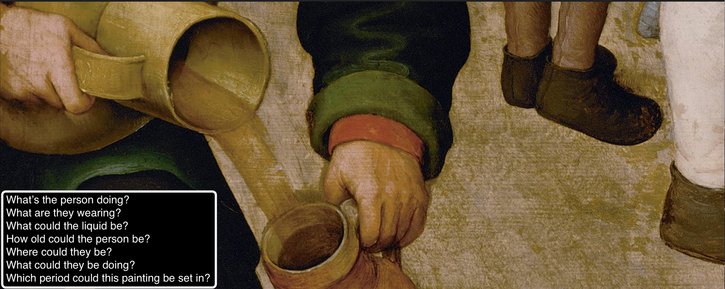 Image Credit: Google Arts & Culture features content from over 1,000 leading museums and archives who have partnered with the Google Cultural Institute to bring the world's treasures online. Image Credit: Google Arts & Culture features content from over 1,000 leading museums and archives who have partnered with the Google Cultural Institute to bring the world's treasures online. Many exams involve describing, comparing and contrasting pictures as well as hypothesizing about them and giving opinions. I love using artwork in my English lessons as it exposes people to lovely works while practising language skills. Using the GOOGLE ART PROJECT a few years ago I expanded a painting to its maximum size to expose incredible details not normally visible to the eye, at the same time making the painting difficult to recognize. This is excellent to hone describing skills as well as hypothesizing about its style and artist, hopefully leading to recognizing the painting. I therefore CHALLENGE YOU to SPEAK ABOUT this FIRST IMAGE of the painting and SEE IF YOU CAN GUESS what PAINTING it is! More images of the same painting to come soon… Write your answers in the comments below! Some language to use: I’m not sure… could may might It must be… It can’t be… I don’t think it’s… Perhaps it’s… Maybe it’s… This activity can also be done in pairs so as prompt each other with questions such as: “What do you think?” “Do you agree?” “Have I missed anything?” I hope you find this useful. Please leave any comments below and if you like this blog, please subscribe for more updates. Susan Something YOUR BODY USES TO LEARN WITH… The five senses are expressed in many different ways in the English language, making us 'feel' these senses depending on what words we choose to use. Unusually teachers do not dedicate too much time to teaching them, robbing us of 'rich' sensations which are fundamental to learning about everything around us by touching, smelling, looking, hearing, tasting and feeling. FIND OUT more about THE DIFFERENCES in HOW TO USE these FIVE IMPORTANT WORDS by WATCHING this VIDEO!
THE HISTOMAP is the first historical map I have found which presents 4000 years of history and the relationships between populations at a glance! Below are just a few ideas, vocabulary and expressions to ask questions with: - Prepare questions using: How long...? Which... ? When... ? Where... ? Who... ? etc. - Comparisons. ' - more powerful than - the most powerful - as... as - New vocabulary, verbs, passive tense and collocations: - conquered (by) - reign lasted - were in power for - lasted - weak / strong - great - destroyed (by) - short-lived - long-lived - Western / Eastern world - Middle-East - developed - grew - maintained - people vs population You can download THE HISTOMAP below. I found it freely downloadable in Internet .. Hope you find some stimulating questions to ask with it! Susan If you have NO TIME to STUDY but want to improve your English in 10 minutes a day, while you are DRIVING TO WORK or MAKING DINNER, check out LEARN ENGLISH NATURALLY with GUIDED FLUENCY & LISTENING PRACTICE ONLY 10 minutes a day take you a very long way… http://bilingual-communications.weebly.com/store/c1/Featured_Products.html Also check out MY PLAYLIST for more of Susan's ESL Learning Videos (Chants & Songs) https://www.youtube.com/playlist?list=PLrvV_PywFOlxgfR5RpMw7rLsI6ai3yHai
Songs always bring a breath of fresh air into the SONGS in the classroom: GRAMMAR GALORE – intermediate / advanced / teens / adults lassroom and are greeted with joy. I usually try to choose songs, which are not only clear and fairly easy to understand but have meaningful content for language learners such as grammar, phrasal verbs or vocabulary pertinent to what we are studying. A wonderful song full of all kinds of grammar and expressions that is for intermediate / advanced students is HOLLYWOOD – Michael Buble. The catchy tune is fun to listen and sing along to whilst the rich assortment of language leads to all kinds of possible adaptations for practice – some of which I have suggested at the end of the document to download. You can download the worksheets to the song below. Feel free to delete or translate the Italian into another language. Can anyone suggest any other songs for practising grammar revision? Hope you have fun with it! Susan
If you liked this song, check out my playlist for other chants and songs:
YOU TUBE PLAYLIST: Susan's ESL Learning Videos (Chants & Songs) English pronunciation has no logic but if you LISTEN carefully you will be able to hear the SUBTLE DIFFERENCES between how a NATIVE says a word & how a learner of English will read a word. DON'T READ! LISTEN & IMITATE the sound you hear - that's the correct pronunciation! Don't be distracted by the way it's written - LISTEN & REPEAT IMITATING!!
Tricky ENGLISH PRONUNCIATION Made Easy is a series to HELP students PERFECTION their PRONUNCIATION in difficult areas of English. Want to speak like a native? Say FACEsssssssBOOK SsssssssLOWLY like a SsssssssNAKE.... Learners of English tend to pronounce the letter S before a consonant at the beginning of a word like a Z so they ZMILE when it ZNOWS; they like ZWIMMING ZLOWLY and they offer UZ a ZLICE of cake just to give a few examples. It gives USsssssss GOOSEsssssssPIMPLES to hear that they live in a HOUZE, that they post THIZ photo on FAZEBOOK! So if you want to speak like a native pay great attention to how we pronounce the letter S in various contexts: http://youtu.be/zMbxBm3gpO8 You can download the picture below. I hope you find this useful. Susan
Tricky ENGLISH PRONUNCIATION Made Easy is a series to HELP students PERFECTION their PRONUNCIATION in difficult areas of English. Pronouncing HUNGRY with a clearly AUDIBLE H and the subsequent letter U with a VERTICALLY OPEN MOUTH (opening the top jaw UP and the bottom jaw DOWN) seems problematic for some students who need to practise this movement and sound very consciously. In contrast there is the pronunciation of ANGRY where absolutely NO H must be heard and the initial letter A must be pronounced with a HORIZONTALLY OPEN MOUTH (opening the MOUTH WIDE from SIDE to SIDE). CORRECT PRONUNCIATION is often UNDERESTIMATED by students who repute us to be exaggerated in our precision but even teachers may have problems understanding a student who does not pronounce words correctly let alone a person on the street or members of an audience at a conference. Therefore CORRECT PRONUNCIATION is a very IMPORTANT part of language acquisition. PRACTISE PRACTISE PRACTISE !! You can download the picture below. I hope you find this diagram as useful. Susan There are teachers who feed information to students whether they like it or not and there are others who teach students to think – the latter are inevitably the best because they not only capture their students’ full attention but leave life-long learning lessons which go way beyond the subject they were teaching. Cattywampus is the story of such a teacher and I use it to practise reading this short piece aloud in class, verify vocabulary comprehension (see below) and get the students to tell us their own Cattywampus stories which we have to decide whether to believe or not. This activity is incredibly engaging for students (which we do in pairs) and the teacher has to inevitably go round helping with vocabulary to express their ideas. If you have an Interactive White Board you can READ IT ONLINE THROUGH LINGRO.COM to get vocabulary explanations: http://cbse-ncert-homework-help.blogspot.it/2013/09/best-teacher-i-ever-had-by-david-owen.html:
Once you have read the story ask students to answer the questions below the text to tell each other a story: what’s your opinion? Is it a Cattywampus? You can download the STORY with QUESTIONS below. I hope you have fun with this activity. Susan
Before having children all my free time was dedicated to globetrotting and I had started writing a book about my travels.
I have always found writing about my personal experiences easier than writing about an imaginary situation which I have never been through. I therefore usually encourage people to base their writing work on something familiar to them and then adapt it to the written assignment making changes where necessary and enriching with adjectives and our imagination. This third post regarding some of my adventures is not only to encourage students to do likewise, thus practising their writing, but to stimulate people into class discussion on the topics students have written about and shared. Many of those stories are outdated as times change, countries develop... Should anyone like to comment & let me know how things have changed since I visited these countries, it would be welcome feedback. A WEARY TRAVELLER'S TALES Tragicomic Episodes from a Globe-Trotter's Diary As a young, well-travelled globe-trotter, I prefer visiting countries in order to get to know the people, their customs and traditions, rather than only seeing the sights from an air-conditioned bus after having left an anonymous first-class hotel. On my travels I have come across many tragicomic episodes worth recounting, which are not only amusing in themselves but offer a great insight into the ways and being of different peoples in far off countries. The best way to appreciate other mentalities and ways of life is to try and integrate oneself with the people by travelling with local forms of transport, eating in local restaurants and sleeping in hotels where one can mix with the locals rather than with tourists. CHINA Part 1 (written in 1987): Whichever form of transport one chooses in China, it is always an adventure. Trains for the foreigner seem to be the most exciting. The communications system is extremely poor so that one can only make seat/couchette reservations at least six days in advance and only from the original station of departure. If you happen to be travelling through the country and stopping off to visit towns for less than six days, as was my case, you can forget trying to make a reservation. Reservations cannot be made when boarding at intermediate stations, since they have no way of knowing which seat/couchettes were booked from the original station of departure. The only hope is to try once on the train. One of our longest train journeys started in Xian, where one can see the famous terracotta army. We managed to book two 'hard seats' (the other class is 'soft seats') and they turned out to be as hard as ever, with very straight backrests. Actually, it was quite interesting to see that once seated, everyone took out a little towel and hung it on a hook above their seats. I later discovered this served to wipe down the continuous streams of sweat that are inevitable in the summer heat despite the numerous fans (which for some reason work when there is the breeze caused by the train speeding along, but do not work when the trains stop at the stations, so that the heat is even more stifling). The next ritual for each passenger was to put a tin cup with lid on the little table jutting out between the facing seats. Into these they added a few tea leaves. Moments after the train left an attendant passed by filling the cups with boiling water from a giant kettle, kept warm on a fire burning between carriages. Thus began our scheduled five hour night journey to Luoyang, where we were to visit the Longmen Caves. Not having found room in the couchettes, we spent the night sharing our two reserved 'hard seats' with another two Chinese who managed to squeeze in, one of whom fell asleep with his head nodding on my shoulder. Eight sleepless hours later we got off at our destination. Having spent the day visiting Luoyang's sights, we bought our onward journey tickets to Beijing. No kind of reservation at all, of course, since this was an intermediate stop and reservations could only be made at Xian. The train was due to leave at 7.30 p.m. but on showing our tickets, we were told that the train was twelve hours late! Considering that Xian is officially five hours journey away, this seemed to be quite a record! We decided to catch the next train which brought us to Zengzhou, on the junction with the Beijing line. Whether this was unacceptable because the Chinese only catch direct trains, or because our tickets were only valid for the direct train was never clear to us. However, amongst heavy protest from the station attendants we boarded the train. At 11.30 p.m. we were at Zengzhou. According to our interpretation of the all-Chinese timetable, the next train to Beijing left at midnight. We lined up to have our tickets amended. After much incomprehension, obviously because what we were doing was not usual, our tickets were updated and we were accompanied to the waiting room area reserved for those leaving on the 6.00 a.m. train. We therefore settled down to our second sleepless night, hoping to steal a few hours nap by resting against each other. Impossible! A uniformed guard walked through the waiting room every half hour and violently shook awake anyone even vaguely dozing. There may have been a "No Dozing!" sign on the wall, but to us illiterate in the Chinese language, it was certainly not apparent. The journey to Beijing was no more eventful than any other that has been spent sitting on a train floor for ten consecutive hours in sweltering heat. However, it was fascinating watching with what dexterity small children were able to manoeuvre their chopsticks whilst eating on a jolting train. Unfortunately the hygienic advantages of modern packaging meant that all polystyrene lunch boxes were automatically thrown from the window of the moving train, littering the still medieval looking Chinese countryside. Subsequent shorter train journeys acquainted us with interesting games that the Chinese love to play. But however clean we all were when we boarded, on arrival our clothes were all a grubby grey, not to mention the dirt under our finger nails. It was only after quite a few trips that we realised this filth was due to the fact that the trains are all run on coal, leaving a sooty trail. For someone born in the electric/diesel train era, this was quite a revelation. * * * CHINA to be continued .... next episode coming soon! Have you ever had any tragi-comic experiences? Susan This second post regarding some of my adventures is not only to encourage students to do likewise, thus practising their writing, but to stimulate people into class discussion on the topics students have written about and shared.
I have always found writing about my personal experiences easier than writing about an imaginary situation which I have never been through. I therefore usually encourage people to base their writing work on something familiar to them and then adapt it to the written assignment making changes where necessary and enriching with adjectives and our imagination. Before having children all my free time was dedicated to globetrotting and I had started writing a book about my travels. Many of those stories are outdated as times change, countries develop... Should anyone like to comment & let me know how things have changed since I visited these countries, it would be welcome feedback. A WEARY TRAVELLER'S TALES Tragicomic Episodes from a Globe-Trotter's Diary As a young, well-travelled globe-trotter, I prefer visiting countries in order to get to know the people, their customs and traditions, rather than only seeing the sights from an air-conditioned bus after having left an anonymous first-class hotel. On my travels I have come across many tragicomic episodes worth recounting, which are not only amusing in themselves but offer a great insight into the ways and being of different peoples in far off countries. The best way to appreciate other mentalities and ways of life is to try and integrate oneself with the people by travelling with local forms of transport, eating in local restaurants and sleeping in hotels where one can mix with the locals rather than with tourists. JAPAN (written in 1990): The Japanese are notoriously clean, leaving their street shoes at the front door. For the uninitiated foreigner this means a lot of practice is needed in slipper changing. Japanese Ryokan are small, but homely hotels in true Japanese style. At the entrance one encounters rows of street shoes neatly lined up under the first step which leads inside. On the step are numerous slippers ready to be donned by anyone who wishes to enter. Once inside these slippers are only to be worn in the halls, never in the rooms, which have 'tatami' mat floors on which one walks in socks or barefoot. Just inside the bathroom, whether private or shared, are other slippers. This means that if I leave my room to use the toilet, I must put on my hall slippers and take them off outside the toilet, because the toilet slippers are just inside. And wo betide the tourist who is caught walking around the hall with the toilet slippers he forgot to slip off again!! * * * Precision is another asset of the Japanese and having lived in Germany, I am quite used to it. However, lining up to catch arriving trains in Japan certainly amazed me. If you buy a ticket with a reservation, you need only to look at the numbered signs along the platform. Besides pointing out where your carriage will stop, the markings on the ground tell you exactly where to stand so you will enter the door which is nearest to your seat number. In fact the train halts exactly with its doors parallel to these markings. This is amazing considering the fact that the Shikansen Bullet Train travels at speeds of up to 250km per hour! * * * In a country like Japan, where a large population is concentrated in a small area, getting away from it all can be most difficult. One Sunday we had the brilliant idea of going to Hakone, a famous national park just outside Tokyo, in order to spend a nice relaxing day next to the mountain lake, hoping to catch a glimpse of Mount Fuji peeking from behind the clouds and carrying a bathing costume to wear in one of the thermal pools of the area. At 8.00 a.m. on a Sunday morning Tokyo station was unusually busy with extra stalls set up to sell "bento"s (packed lunches) and families loaded with small rucksacks hurrying to the trains. Once off the Shinkansen train at Odawara station, we lined up to get our onward tickets. A fifteen minute train ride brought us to Yumoto but by the time we got off, our next train was jam packed and we crammed in to stand like sardines for the half hour trip. At Gora a twenty-minute queue allowed us to get tickets for the cog-wheel train in which we actually sat for the very few minutes it took to get to the top, Souzuno. There we queued for another fifteen minutes in order to catch the longest cable car in Asia. The view was impressive and at the first station we stopped off to see some geysers, which were definitely not worth the time we spent waiting to get back on. At the second station we had intended getting off to bathe in the thermal pools but the staff told us we would never get back on, since no empty cars were coming through. At the top, Togendai was where we found our mountain lake but there seemed to be nowhere to relax. We were not able to enjoy the peacefulness we had been looking forward to because the area was just not peaceful. So we lined up to cross the lake on the red and gold painted boat, camouflaged as an old sailing ship and once finally on it, we tried to relax for the forty minutes we stood on the crowded boat. The lake of volcanic origin was extremely beautiful but at that point we were so stressed that we were unable to enjoy it. Not finding anywhere to sit down and relax because the buses were belching black fumes on the lake front, not having even caught a tiny glimpse of Mount Fuji, we decided to take the bus back down and three-quarters of an hour later we were in Yumoto again. On the short train ride to Odawara, we decided to let everyone else rush home to Tokyo whilst we stopped in this calm, uncrowded town of little interest to have a relaxing meal. * * * .... next episode coming soon! Have you ever had any tragi-comic experiences? Susan In constant search for stimulating materials to use with my wide age and level range of students a couple of months ago I stumbled upon THE HISTOMAP which then got lost in my jungle of digital files buried in my computer. It casually reappeared on my screen at the end of the school year and I felt the urge to print and laminate it, sticking it's colourful seven-page vertical length on a column in front of my main entrance door where it is always met with curiosity and fascination. It is the first historical map in my possession which presents 4000 years of history and the relationships between populations in an immediately decipherable context. I have finally come to understand history at a glance! The other day it occurred to me what a potential THE HISTOMAP has for CLIL history lessons but not only... below are just a few ideas which came to mind: - Groups of students prepare questions for other groups using: How long...? Which... ? When... ? - Comparisons can be made: - more powerful than - the most powerful - as... as - New vocabulary, verbs, passive tense and collocations can be introduced: - conquered (by) - reign lasted - were in power for - lasted - weak / strong - great - destroyed (by) - short-lived - long-lived - Western / Eastern world - Middle-East - developed - grew - maintained - people vs population - RESEARCH PROJECTS can be given to youngsters to then present to everyone - ADULTS can tell us anything they know about the various historical periods or populations from personal knowledge. Any other ideas?? You can download THE HISTOMAP below. I found it freely downloadable in Internet .. Hope you find some more stimulating activities to do with it! Susan
My daughter Laura, sixteen years old, has proven the STRENGTH OF MOTIVATION to me: dire hard work and WILLPOWER almost beyond her limits has brought her to the EUROPEAN SPEEDSKATING CHAMPIONSHIPS as well as passing her very demanding school year with flying colours. Here I sit in my camper in Austria at the start of the venue, not worried about what the outcome will be, but reflecting on the arduous road that led us here - sheer motivation and willpower. She is not one of those talents to whom everything falls easy, she has worked hard against all odds to reach her two goals in sports and education.
This has given me a new insight to learning as I tend to believe that curiosity and enjoyment are the best stimuli for learning and retaining what one learns. Motivation is certainly another fundamental ingredient but I feel that for most people it is difficult to find the willpower to do something they don't at least partially enjoy, despite the hard work it may comprise. So I utterly admire those who find the willpower to carry on doing something that may not give them the desired results - or at least not immediately. Motivating students is therefore one of my top priorities: arousing their curiosity and making it as enjoyable as possible so that they want to carry on learning outside the classroom, using various methods, media, adjustments to their social networks and corresponding with foreigners as well as travelling whenever possible. That is where technology inside and outside the classroom as well as games make learning much more effective and exciting than it used to be. My holiday homework always comprises at least DAILY: WATCHING VIDEOS: - VOSCREEN - 5 seconds listening (as many times as you like) to bits of films, cartoons, ads... before pressing the button which reveals the subtitle in English - to see if you're right!! = 5 minutes a day http://www.voscreen.com/game/682/ehjcj5hfhb9bdvr/it/ - ORORO.TV – TV series & films with subtitles = 5 - 45 minutes a day (depending on your level) - http://ororo.tv/en/ - LyricsTraining - SONGS (LISTENING & COMPLETING): http://lyricstraining.com LyricsTraining is an easy and fun way to learn and improve your foreign languages skills, through the music videos and the lyrics of your favourite songs. LyricsTraining also has a special Karaoke mode that lets you sing and enjoy the full lyrics = as often as is fun GAMES to practise your English: - ESL Fun Games Online http://www.eslgamesworld.com/members/games/index.html - ESL Revision Fun Games Online - http://www.eslgamesworld.com/Revision/Revision_Games.html READING: http://news.bbc.co.uk/cbbcnews/ - ONLINE ENGLISH NEWSPAPER for English kids aged 8 -14 so simplified information LEARNING: MINDMAPLE - super-easy mind mapping tool for writing up phrases, collocations and vocabulary in context. plus: - putting Mobile phone settings in English - putting Facebook (& other social network) settings in English - putting computer settings in English - and generally SURROUNDING YOURSELF WITH ENGLISH so your brain switches into English mode. Update on the venue of the EUROPEAN SPEEDSKATING CHAMPIONSHIPS: Day 1: my daughter Laura helps her teammate make it to the gold medal; Day 2: she gets pulled down by another competitor onto the asphalt at 40 km/hr, jumps up to continue the race with her teammate (also involved in the multiple fall) when blood streams copiously into her eye: 3 stitches, a black eye, bruised shoulder and various scrapes; luckily her seriously bruised teammate still makes the gold medal! Day 5: still not allowed to race (doctor's orders); Day 6: despite a huge plaster covering half her eye she races her 10,000 metre points race to win a GOLD MEDAL and become EUROPEAN CHAMPION of her category in that particular race. Driven by sheer MOTIVATION and DETERMINATION - "Where there's a will there's a way!" - something to instil in our students!! Poems I find are difficult to present in an appealing way, more so if they are for students of English. Many years ago I attempted a project fueled by my enthusiasm for the MUSICAL CATS in which I presented one T.S. Eliot’s CATS poem a week with comprehension questions of various nature. In those days we listened to the song on cassette but I would recommend showing a You Tube Video to them on the IWB to make it more exciting. For intermediate/advanced students I find that SKIMBLESHANKS the Railway Cat – Musical: CATS is rather fast as it mimics the speed of the train but the poem/song also gives us the opportunity to discuss TRAVELLING BY TRAIN in the past and today on normal trains and luxury trains like the ORIENT EXPRESS. It can also arouse curiosity to watch the entire musical and can lead to interesting discussions. I plan on occasionally posting poems from my CATS Project in the hope they may be of interest to students and teachers and would welcome any feedback. You can download the worksheets to the song below. Feel free to delete or translate the Italian into another language. Hope its another interesting way of learning English! Susan
Also check out MY PLAYLIST
for Susan's ESL Learning Videos (Chants & Songs) https://www.youtube.com/playlist?list=PLrvV_PywFOlxgfR5RpMw7rLsI6ai3yHai Songs always bring a breath of fresh air into the classroom and are greeted with joy. I usually try to choose songs, which are not only clear and fairly easy to understand but have meaningful content for language learners such as grammar, phrasal verbs or vocabulary pertinent to what we are studying. For intermediate/advanced students I find that IF I WERE A RICH MAN – Musical: Fiddler on the Roof is not only repetitive easily teaching the SUBJUNCTIVE with practically no effort but the song also gives us the opportunity to discuss the historical and religious context the musical is set in: a small Jewish community in a Russian village with all its traditions and its relationship with the Christian community in and outside the village. All in all a catchy tune which can also arouse curiosity to watch the entire musical and can lead to interesting discussions. You can download the worksheet to the song below. Feel free to delete or translate the Italian into another language. Hope you have fun with it! Susan
I have always found writing about my personal experiences easier than writing about an imaginary situation which I have never been through. I therefore usually encourage students to base their writing work on something familiar to them and then adapt it to the written assignment making changes where necessary and enriching with adjectives and their imagination. As in most families, my life is divided into two eras: BC (before children) and AC (after children). In my BC days all my free time was dedicated to globetrotting and I had started writing a book about my travels. Many of those stories are outdated as times change, countries develop... I would like to start posting some of my adventures not only to encourage students to do likewise, thus practising their writing, but to stimulate people into class discussion on the topics students have written about and shared. Should anyone like to comment & let me know how things have changed since I visited these countries, it would be welcome feedback. A WEARY TRAVELLER'S TALES
Tragicomic Episodes from a Globe-Trotter's Diary As a young, well-travelled globe-trotter, I prefer visiting countries in order to get to know the people, their customs and traditions, rather than only seeing the sights from an air-conditioned bus after having left an anonymous first-class hotel. On my travels I have come across many tragicomic episodes worth recounting, which are not only amusing in themselves but offer a great insight into the ways and being of different peoples in far off countries. The best way to appreciate other mentalities and ways of life is to try and integrate oneself with the people by travelling with local forms of transport, eating in local restaurants and sleeping in hotels where one can mix with the locals rather than with tourists. Ways of the World (written in 1988): Srinigar, the capital of Kashmir in the very north of India, is famous for its houseboats, where tourists stay in fully furnished rooms often with private bathrooms, enjoying exquisite meals in chandaliered dining rooms before lounging in luxuriously carpeted living rooms. We were staying in a more modest two bedroom houseboat with private bathroom, which nevertheless had a beautifully carved table amongst its luxuries in the living room. One evening I was relaxing on my bed when I heard a strange metallic rattling and immediately attributed it to the noise the ropes make when they hit the mast in the wind. Only shortly afterwards did it occur to me that our houseboat had no mast. Then I listened and felt it must be in the room. I took my torch and looked under the armchair: there, in a cage, was a huge rat scratching at the door to get out. I called the owner immediately, who reacted by saying, "Thank goodness you found it. It's been running around the boat for days and so I thought I'd put a trap in your room just in case." It was very unpleasant to know a rat had been roaming our room and that others could be around, but to find out that the owner had let it free on the other side of the lake because he "hadn't the heart to kill it," certainly surprised us. .... next episode coming soon! Have you ever had any tragi-comic experiences? Susan SONGS in the classroom: GOTTA/GONNA/WANNA/AIN’T – intermediate / advanced / teens / adults25/6/2015 Songs always bring a breath of fresh air into the classroom and are greeted with joy. I usually try to choose songs, which are not only clear and fairly easy to understand but have meaningful content for language learners such as grammar, phrasal verbs or vocabulary pertinent to what we are studying. For intermediate/advanced students I find that WHERE IS THE LOVE? – Black Eyed Peas is rather fast and has difficult vocabulary but repetitively stresses various language structures including phrasal verbs and slang abbreviations like gotta/gonna/wanna/ain’t. The song is an opportunity to discuss many controversial subjects and expressions which I have noted at the end of the song. All in all a catchy tune with profound ideas which can lead to interesting conversations. You can download the worksheets to the song below. Feel free to delete or translate the Italian into another language. Hope you have fun with it! Susan If you liked this song, check out my playlist for other chants and songs: YOU TUBE PLAYLIST: Susan's ESL Learning Videos http://www.youtube.com/playlist?list=PLrvV_PywFOlxgfR5RpMw7rLsI6ai3yHai
|
Categories
All
Would you like regular English learning & teaching ideas? Subscribe to my blog so you don't miss a post!
AuthorMy name is Susan Brodar, born in London into a multilingual family and brought up bilingual English / Italian. Archives
December 2018
|
|||||||||||||||||||||||||||||||||||||||||||||||||||||||||||||||||||||||||||||||||||||||||||||


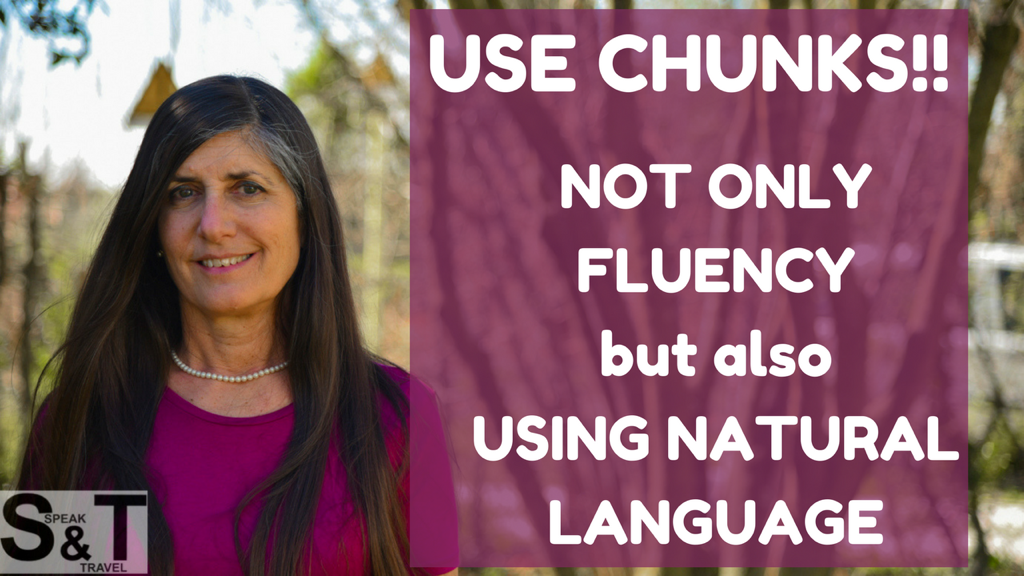

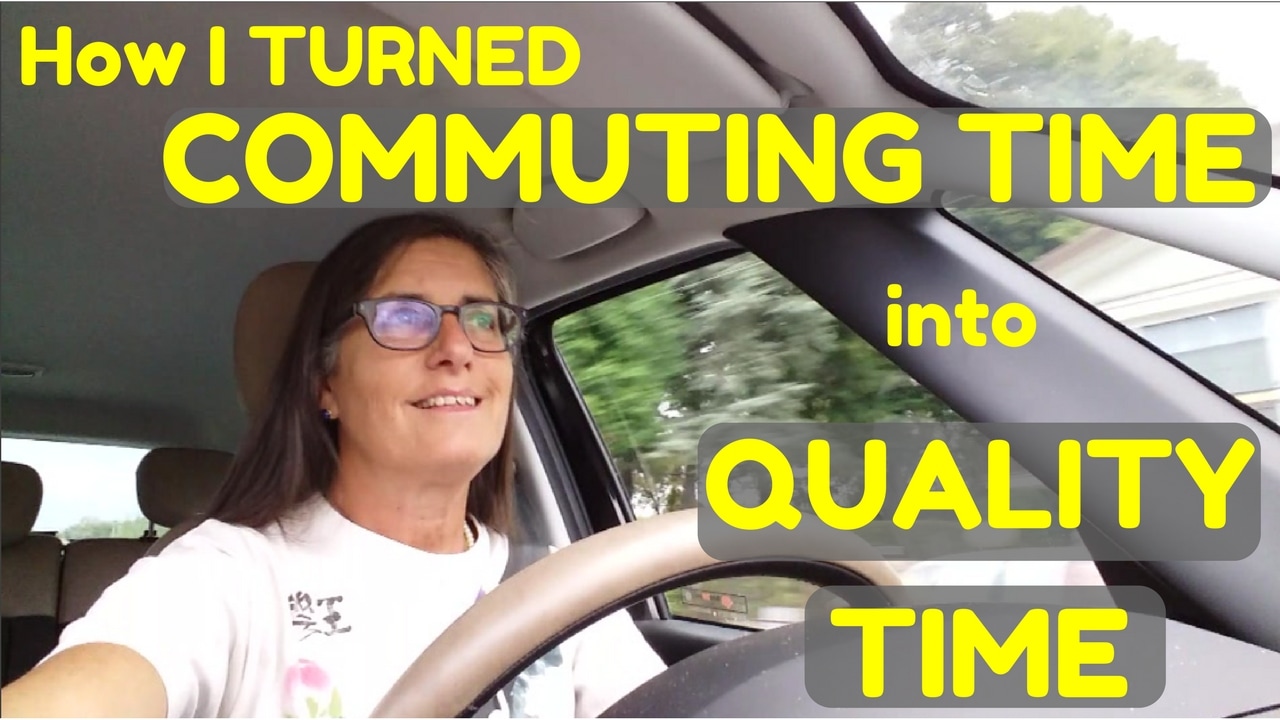




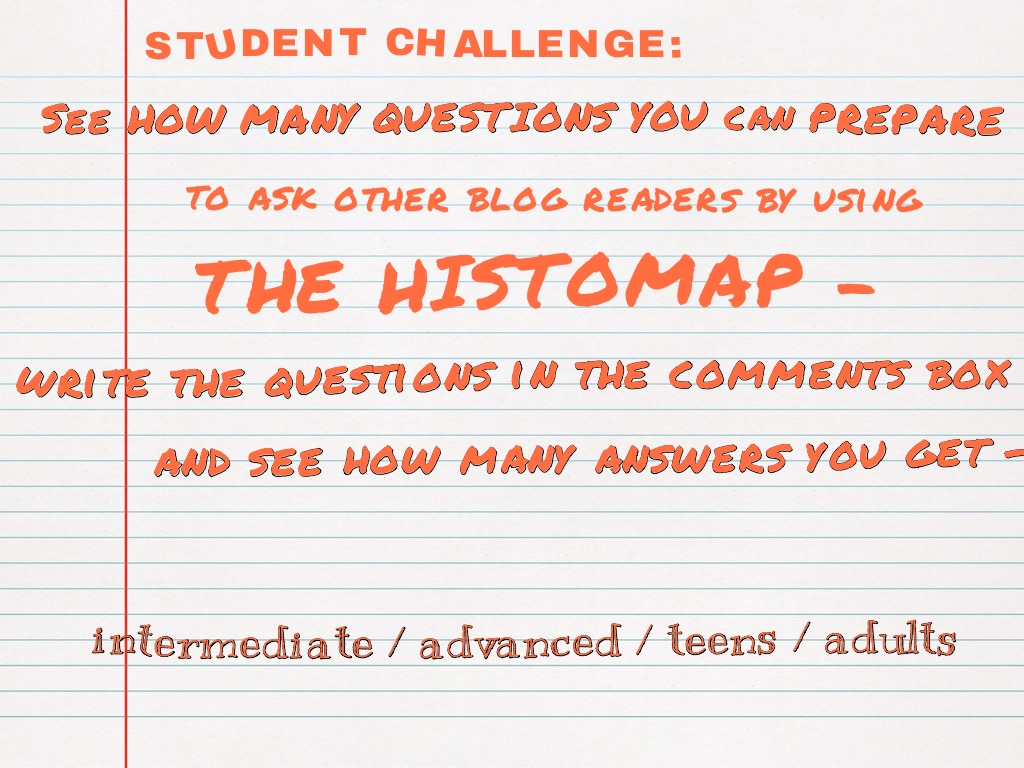
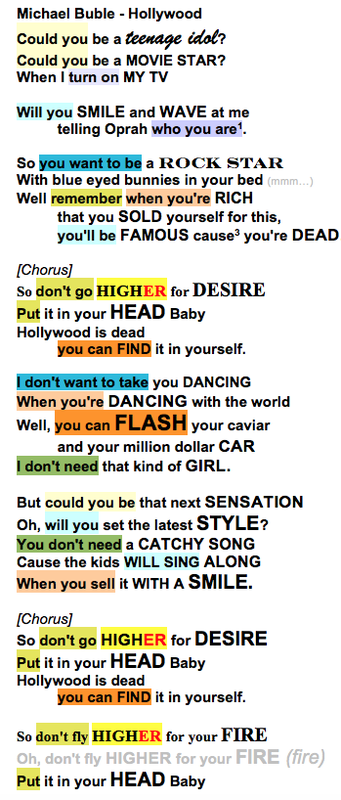
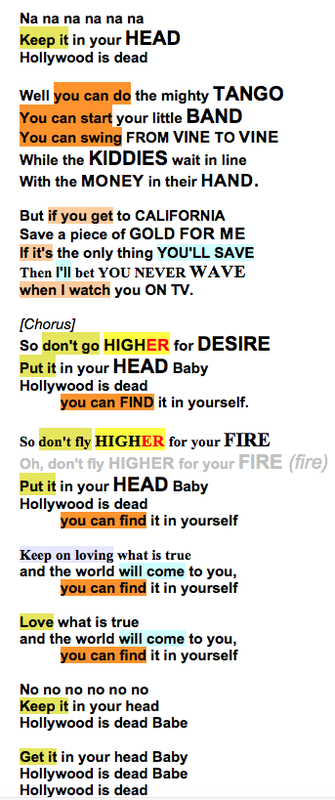





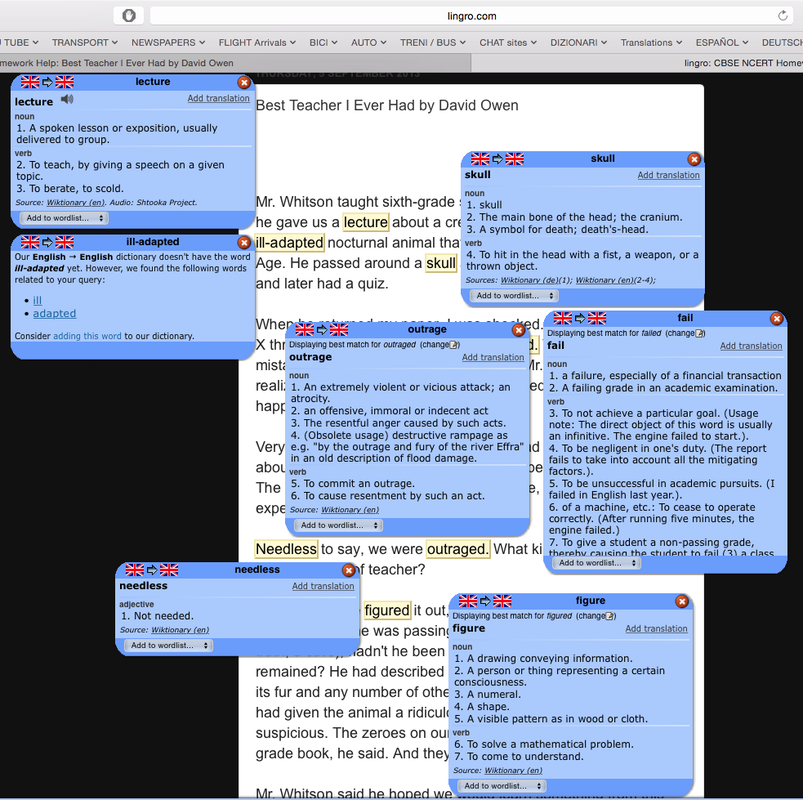

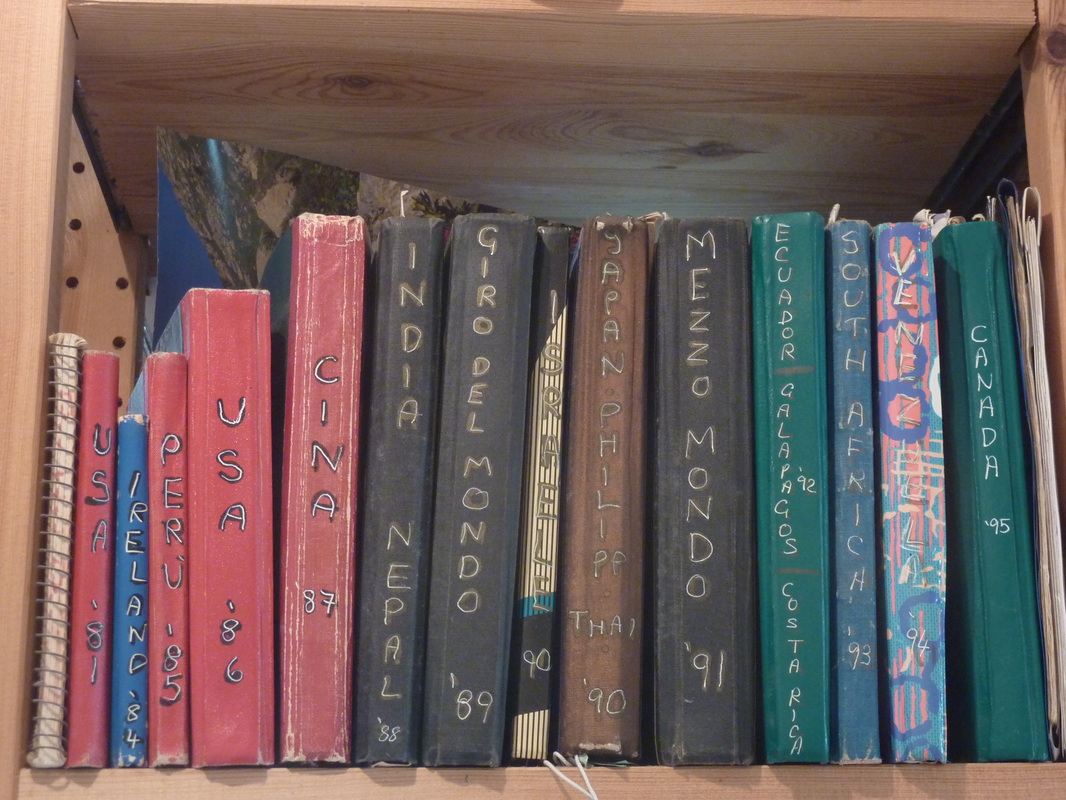


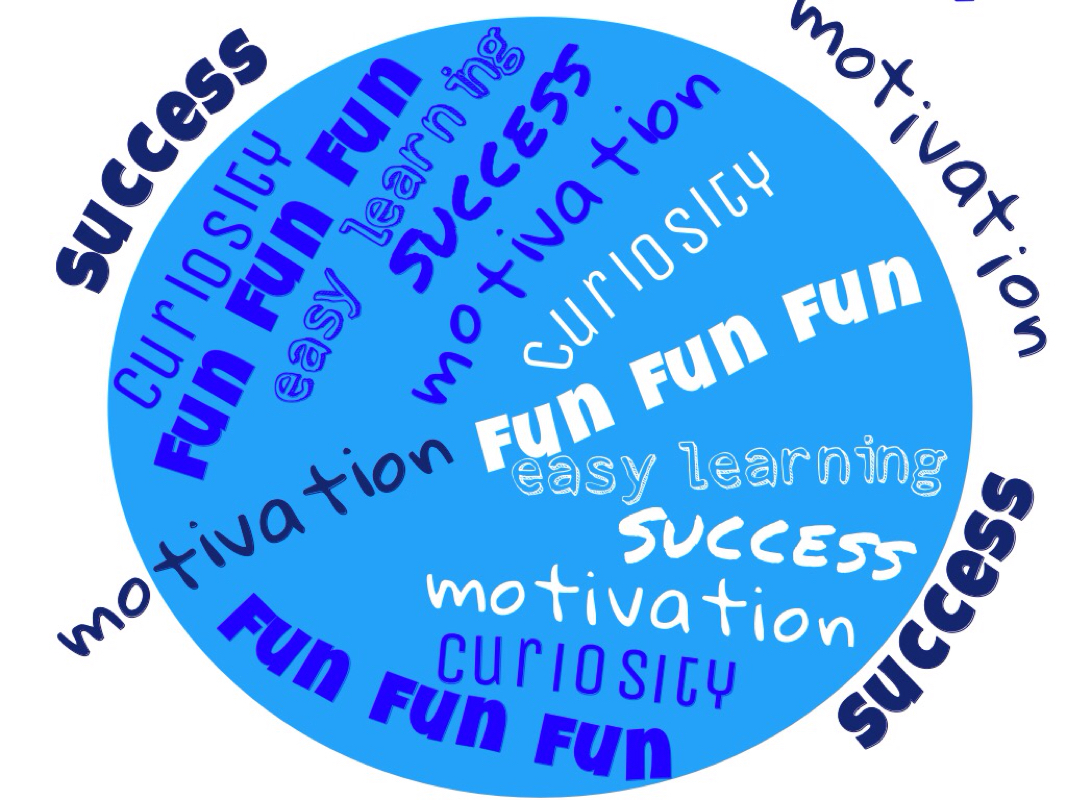








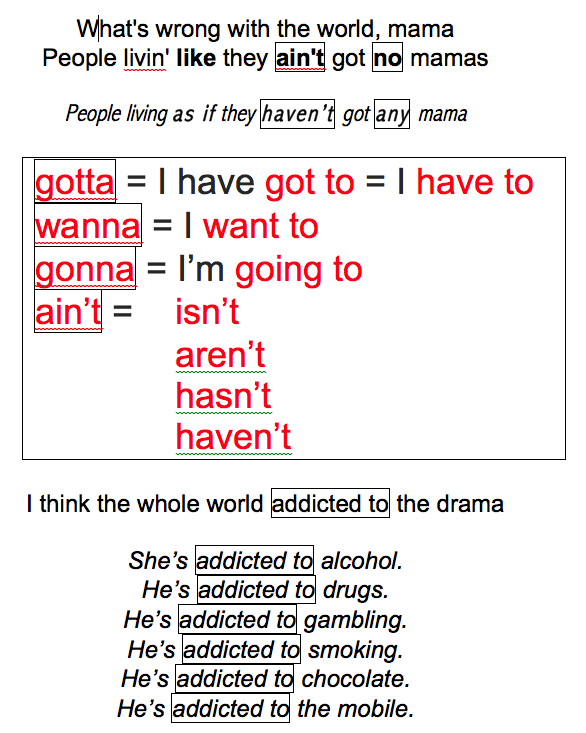



 RSS Feed
RSS Feed





